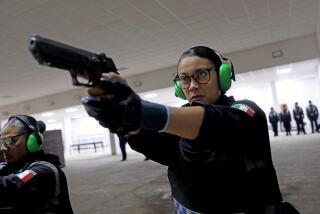Guatemala Celebrates Return to Democracy but Country Still Is Polarized
GUATEMALA CITY â The advertisement, two days after Guatemala returned to democracy, was eloquent: It showed a station wagon against the background of a heavy tank and said: âProtect Yourself; Armor Your Vehicle.â
Splashed over two-thirds of a page in the conservative Prensa Libre newspaper, the ad offered to armor every type of vehicle with âlight materials highly resistant to bullets.â It promised affordable prices, complete with installment plans. It assured prompt maintenance.
And, as a final sales pitch, Magnum Security Systems pledged to âchange damaged bulletproof windows.â
âLegacy of Fearâ
The ad provided a vivid illustration of the âterrible legacy of mistrust and fearâ stressed by Christian Democratic leader Vinicio Cerezo in his inauguration speech as president of Guatemala.
Cerezo, a 43-year-old lawyer and political moderate, was sworn in last month in a ceremony that marked Guatemalaâs return to constitutional, democratic government after more than three decades of military-dominated rule.
âIn our political life, violence has been a permanent substitute for negotiation and compromise,â Cerezo said. âSome Guatemalans opted for the absurd and primitive language of physical damage and armed reprisal.â
â . . . Thousands of Guatemalan lives have fallen in this frightful vortex of fratricidal violence, hundreds of thousands of us have suffered in one form or another from the effects of this general climate of oppression,â he continued.
Crowd of 50,000
On the night of Cerezoâs inauguration, at least 50,000 people jammed the main square of Guatemala City, dancing, singing and cheering in an emotional display of hope and confidence in their youthful new leader.
But beneath the euphoria, fears persist that old habits will die hard in a country where killings and âdisappearancesâ became commonplace under a long string of right-wing military governments.
Up to 100,000 people are estimated to have been killed in the last three decades in army campaigns against left-wing guerrillas and suspected sympathizers. Neither side in the war, Central Americaâs longest, has shown any mercy.
âThis is an extremely polarized country,â said a veteran Western diplomat here. âFor long, long years there have been only two colors--black and white. No shades of gray. It will take a long time to change attitudes here.â
Fear of Kidnaping
Those wealthy enough to armor their vehicles--Cerezoâs own jeep station wagon was fortified against bullets and grenades at a cost of more than $100,000--fear being attacked or kidnaped by the armed left.
The fears of the wealthy run so deep that many coffee farmers in the fertile land along the Mexican border no longer dare to sleep on their estates, preferring instead to commute daily from towns under firm army control.
Those who stay on their plantations in San Marcos province have automatic rifles within easy reach, reminiscent of white farmers in the final days of white-ruled Rhodesia.
Within the broad spectrum of political opinion that is considered left in Guatemala, including the Christian Democratic Party, there are fears of a violent right-wing backlash.
Death Squad Reappears
Four days after Cerezo won a comfortable victory in run-off elections on Dec. 8, a right-wing death squad made a gruesome reappearance after an absence of years.
The Secret Anti-Communist Army, an organization active in the 1970s, claimed responsibility for killing a young teacher who had been temporarily detained by the army on suspicion of having links with left-wing guerrillas.
After her release from army detention, diplomats said, 27-year-old Beatriz Eugenia Barrios Marroquin went to the Canadian Embassy, where she was granted a visa on the grounds that her life was in danger.
A day before the woman was due to leave for Canada, officials said, her body was found with both hands cut off and a note signed by the Secret Anti-Communist Army pinned to her chest. âThere are more to come,â the note said.
âDrastic Measuresâ Predicted
The Secret Army made headlines again a few days before Cerezoâs inauguration when anonymous telephone callers told local newspapers that âdrastic measuresâ would be taken against Nicaraguan President Daniel Ortega, one of the four Latin American presidents who attended the ceremony.
The Secret Army failed to carry out its threat, possibly because Ortega was tightly guarded, but daubed its initials on walls in several residential districts of the capital.
International human rights organizations have blamed the army and security forces for the majority of civilian killings since the CIA-sponsored coup that toppled reformist President Jacobo Arbenz in 1954.
âOne of the yardsticks against which Cerezo will be measured will be his ability to curb human rights abuses in Guatemala,â a European ambassador said. âIt would be premature to make predictions.â
No Argentine Precedent
Cerezo pleaded âprofound respect for human rightsâ in his inauguration speech. But he also made clear that he had no intention of following the example of Argentinaâs Raul Alfonsin in putting on trial military men suspected of human rights abuses.
One of the last decrees passed by the outgoing military government of Gen. Oscar Mejia Victores barred legal action against army personnel suspected of hundreds of killings and disappearances.
The decree, made public less than 24 hours before Guatemala returned to civilian rule, declared a general amnesty for âcommon and political crimesâ committed between March 23, 1982, and Cerezoâs inauguration.
Thousands Reported Killed
On March 23, 1982, Mejia Victoresâ predecessor, Gen. Efrain Rios Montt, launched a ruthless counterinsurgency campaign in which thousands of civilians were reported killed.
Legal experts here said the amnesty effectively demolished the legal basis for Guatemalaâs only human rights organization, the Grupo Apoyo Mutuo (Mutual Support Group).
Apoyo Mutuo has been pressing the authorities to account for the fate of more than 770 missing Guatemalans--all of whom vanished in the period covered by the amnesty.
More to Read
Sign up for Essential California
The most important California stories and recommendations in your inbox every morning.
You may occasionally receive promotional content from the Los Angeles Times.










